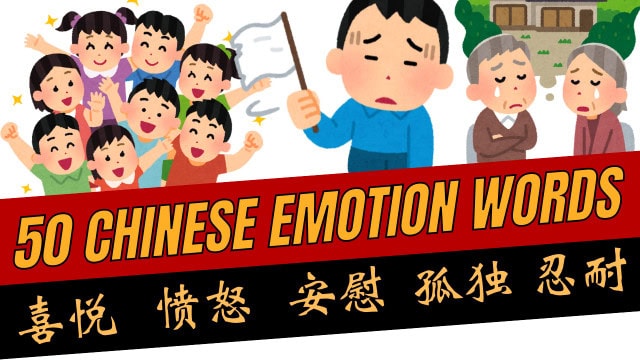Chinese Language is more than a tool for communication; it is a medium through which we express our inner thoughts, shape our experiences, and connect with others. One of the most potent aspects of the Chinese language is learning emotional words in Chinese that carry feelings and evoke responses. Learning emotional words in Chinese is crucial to effective communication because it goes beyond simple vocabulary expansion. It influences how we perceive the world, navigate social interactions, and build deeper relationships. Emotional words in Chinese add layers of meaning and nuance, making our interactions richer and more impactful.

When we develop our emotional vocabulary in Chinese, we become better equipped to recognize, label, and communicate our feelings and those of others. This process helps us identify our emotions more clearly, which is the first step toward self-awareness and emotional regulation. Imagine trying to explain a complex emotion like “melancholy” without the right word; we might use a broad term like “sad” that doesn’t quite capture its essence. With the correct emotional words, we can accurately describe what we feel and why, fostering better mental health and self-understanding.
Beyond self-expression, emotional words enhance our social interactions by improving empathy and interpersonal relationships. When we can articulate emotions effectively, we create a space for others to feel seen and understood.
Emotional Words In Chinese
喜悦 xǐ yuè – Joy
中奖后她感到无比的喜悦。
Zhōng jiǎng hòu tā gǎn dào wú bǐ de xǐ yuè.
She felt extremely happy after winning the prize.
恨 (hèn) – hate
老婆恨老公没有对她说真话。
Lǎo pó hèn lǎo gōng méi yǒu duì tā shuō zhēn huà.
The wife hates that her husband didn’t tell her the truth.
难过 (nánguò) – sad
小狗死后,小明难过得吃不下饭。
(Xiǎogǒu sǐ hòu, Xiǎomíng nánguò de chī bù xià fàn.)
After the puppy died, Xiaoming was so sad that he couldn’t eat.
快乐 (kuàilè) – joyful
她今天很快乐。
Tā jīn tiān hěn kuài lè.
She is very happy today.
生气 (shēngqì) – angry
他是个动不动就会生气的人。
Tā shì gè dòng bù dòng jiù huì shēng qì de rén.
He is the kind of person who gets angry easily.
兴奋 (xīngfèn) – excited
看到偶像后,她们兴奋到哭了。
Kàn dào ǒu xiàng hòu, tāmen xīn gfèn dào kūle.
After seeing the idol, they were so excited that they cried.
失望 (shīwàng) – disappointed
没能考上大学,他非常失望。
Méi néng kǎo shàng dàxué, tā fēi cháng shī wàng.
He is very disappointed for not being able to get into college.
惊讶 (jīngyà) – surprised
什么事能让他如此惊讶?
shén me shì néng ràng tā rú cǐ jīng yà?
What could make him look so surprised?
害怕 (hài pà) – afraid
他很害怕蜘蛛。
Tā hěn hàipà zhīzhū.
He is very afraid of spiders.
害羞 (hàixiū) – shy
他看到陌生人就会很害羞。
Tā kàn dào mòshēng rén jiù huì hěn hài xiū.
He becomes very shy when he sees strangers.
羞愧 (xiūkuì) – ashamed
他对自己犯的错深感羞愧。
Tā duì zìjǐ fàn de cuò shēn gǎn xiūkuì.
He feels deeply ashamed of the mistakes he made.
忧虑 (yōulǜ) – worried
她对现状感到忧虑。
tā duì xiàn zhuàng gǎn dào yōu lǜ.
She is worried about the current situation.
满意 (mǎnyì) – satisfied
他很满意餐馆的包子。
tā hěn mǎn yì cān guǎn de bāo zi.
He is very satisfied with the restaurant’s dumplings.
悲伤 (bēishāng) – sorrowful / sad
男友跟她分手后,她悲伤 极了。
nán you gēn tā fēn shǒu hòu, tā bēi shāng jí le.
After her boyfriend broke up with her, she was extremely sad.
愤怒 (fènnù) – furious
他愤怒地把书拍在桌上。
Tā fènnù de bǎ shū pāi zài zhuō shàng.
He furiously slammed the book on the table.
感动 (gǎndòng) – moved
她被故事的情节感动到 流泪。
tā bèi gù shì de qíng jié gǎn dòng dào liú lèi.
She was moved to tears by the story line.
感激 (gǎnjī) – grateful
我非常感激你的帮忙。
wǒ fēi cháng gǎn jī nǐ de bāng máng.
I am very grateful for your help.
想念 (xiǎngniàn) – miss (someone)
每逢过节,她就会非常想念家人。
měi féng guò jié, tā jiù huì fēi cháng xiǎng niàn jiā rén.
Every time a holiday comes, she misses her family very much.
思念 (sīniàn) – long for / miss
他们非常思念故乡。
tā men fēi cháng sī niàn gù xiāng.
They miss their hometown very much.
绝望 (juéwàng) – hopeless
小丽绝望地坐在地上哭。
xiǎo lì jué wàng de zuò zài dì shàng kū.
Xiao li sits on the floor crying hopelessly.
孤独 (gūdú) – lonely
他孤独地坐在角落,一句话也没说。
tā gū dú de zuò zài jiǎo luò, yī jù huà yě méi shuō.
He sat alone in the corner, not saying a word.
寂寞 (jìmò) – lonesome
儿女都不在他身边,他感到很寂寞。
ér nǚ dōu bù zài tā shēn biān, tā gǎn dào hěn jì mò.
He feels lonely without his children by his side.
同情 (tóngqíng) – sympathetic
小丽很同情小美的遭遇。
xiǎo lì hěn tóng qíng xiǎo měi de zāo yù.
Xiao li feels very sympathetic toward Xiao mei’s situation.
厌恶 (yàn wù) – loathe / intense dislike
小强很厌恶吃蔬菜。
Xiǎo qiáng hěn yàn wù chī shū cài.
Xiao qiang strongly dislikes eating vegetables
恐惧 (kǒngjù) – terrified
小丽恐惧打雷。
Xiǎo lì kǒng jù dǎ léi.
Xiao li is terrified of thunder.
In conclusion, learning emotional words in Chinese is about more than just expanding our vocabulary. It is about gaining a deeper understanding of our emotions and those of others, enhancing our ability to connect, and creating more meaningful personal and professional relationships. As we grow our emotional vocabulary, we unlock new ways to express ourselves, fostering a greater sense of empathy, clarity, and emotional intelligence.
Click here to watch this post on YouTube.
